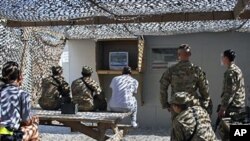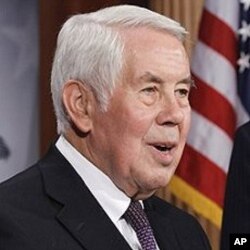Capturing or killing Osama bin Laden and other terrorists was a primary goal of the U.S.-led invasion of Afghanistan. Speaking days after the September 11, 2001 terrorist attacks on the United States, then-President George W. Bush pledged that America would find bin Laden.
"I want justice," Bush said. "There is an old poster out West, as I recall, that said, ‘Wanted: Dead or Alive.’"
Nearly a decade later, President Bush’s wish became reality. But the war in Afghanistan has gone on for years - long after the country's ruling Taliban was ousted and al-Qaida found new countries from which to operate, such as Yemen.
John Kerry
Senate Foreign Relations Committee Chairman John Kerry of Massachusetts said Tuesday that the killing of bin Laden highlights critical choices confronting the United States in Afghanistan.
"With the death of bin Laden, some people are sure to ask why we don’t pack up and leave Afghanistan," said Kerry. "So it is even more compelling that we examine carefully what is at stake and what is our real security challenge."
Richard Lugar
The ranking Republican senator on the committee, Richard Lugar, pointed to the costs of the war in Afghanistan, now more than $100 billion a year. Lugar noted that U.S. operations in Afghanistan dwarf counter-terrorism efforts in Yemen, despite assessments by U.S. officials that Yemeni-based terrorists pose a greater threat than those in Afghanistan.
The Indiana senator said he doubts that Afghanistan can become a self-sustaining, secure, stable democracy free of terrorist influences. He urged President Barack Obama to spell out U.S. goals there going forward.
"President Obama must be forthcoming on a definition of success in Afghanistan based on U.S. vital interests and a sober analysis of what is possible to achieve," said Lugar. "The outcome in Afghanistan when U.S. forces leave will be imperfect. But the president has not defined which imperfections would be intolerable."
Richard Haass
Testifying at the hearing was Richard Haass, president of the Council on Foreign Relations. Haass said U.S. efforts to degrade the Taliban in Afghanistan while bolstering Afghan security forces are unlikely to produce the results the Obama administration hopes for.
"I am deeply and profoundly skeptical that this policy will work, given the nature of Afghanistan - in particular, the weakness of its central institutions, and the reality that Pakistan will continue to provide a sanctuary for the Taliban," said Haas.
Even if long-term success in Afghanistan is possible, Haass argued that America’s overstretched military and financial resources would be better-spent elsewhere.
"Afghanistan over the years has evolved from a war of necessity to a war of choice. Afghanistan no longer represents a significant global terrorist threat, and certainly no more than several other countries in the region, most notably Pakistan. Afghanistan is a strategic distraction, pure and simple."
Haass advocated dramatically scaling back U.S. operations in Afghanistan, focusing on a limited anti-terrorism mission rather than nation-building.
Anne-Marie Slaughter
But former State Department official Anne-Marie Slaughter warned senators that limiting U.S. operations in Afghanistan has already been tried with disastrous results that prompted President Obama to order a temporary surge in U.S. forces deployed there.
"We drove the Taliban out very fast, then we moved to a limited counter-terrorism strategy," said Slaughter. "After three or four years, the Taliban were deeply resurgent."
Slaughter said clearing Taliban strongholds and bolstering the Afghan government could help bring about a negotiated end to the war.
"We could achieve that if we have a stable government in Afghanistan that includes part of the Taliban that does not host al-Qaida," Slaughter said. "If we can get to an agreement, our interests are served."
Some senators expressed fatigue and exasperation over a war that few predicted would last this long.
Richard Durbin
Democrat Richard Durbin of Illinois said he voted for the invasion of Afghanistan.
"I voted to go after al-Qaida, and to find and, if necessary, kill Osama bin Laden. Now here we are almost ten years later," Durbin said. "If you would have asked me whether I was signing up for the longest war in American history, which has no end in sight - even after the killing of Osama bin Laden - that isn’t what I thought I was voting for."
While hailing Osama bin Laden’s death at the hands of U.S. Special Forces, the Obama administration has given no indication the demise of the terrorist leader will alter the 2014 target date for withdrawing U.S. troops from Afghanistan.






